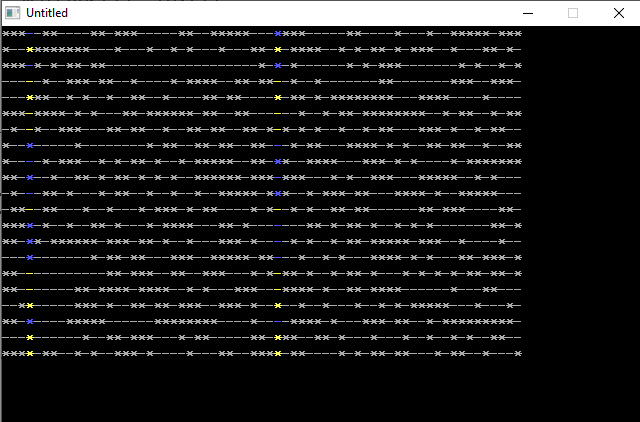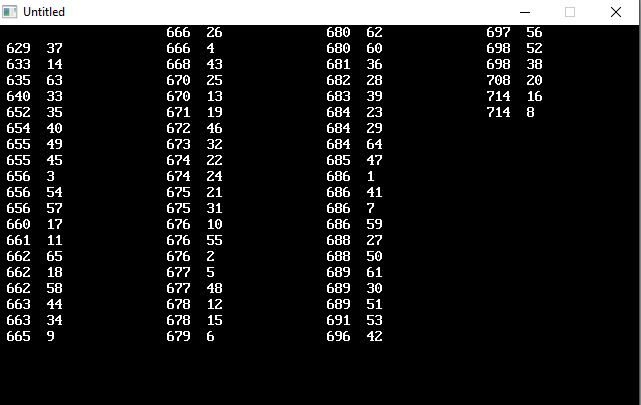Posts: 4,129
Threads: 185
Joined: Apr 2022
Reputation:
242
11-14-2023, 09:54 AM
(This post was last modified: 11-14-2023, 10:01 AM by bplus.)
This is crazy to order the columns most simialr to all the other columns???
You can only compare all the other columns to one of the columns for a proper compare of matches.
Otherwise a column thats all *'s will match perfectly any other column with random *'s if that's what you really want then order the columns by most *'s
b = b + ...
Posts: 2,837
Threads: 340
Joined: Apr 2022
Reputation:
246
(11-14-2023, 09:54 AM)bplus Wrote: This is crazy to order the columns most simialr to all the other columns???
You can only compare all the other columns to one of the columns for a proper compare of matches.
Otherwise a column thats all *'s will match perfectly any other column with random *'s if that's what you really want then order the columns by most *'s
Not really, I don't think. Take a look at this example:
x----
x----
x----
x----
-xxxx
Now the first column has 4 stars, but it doesn't match any of the other columns.
The other columns only have 1 star, but they all match in the same row.
I'm thinking that it might be the 4 columns that we're looking for here, rather than the 1 column with all the stars?
Posts: 151
Threads: 12
Joined: Apr 2022
Reputation:
56
11-14-2023, 01:34 PM
(This post was last modified: 11-14-2023, 02:01 PM by RhoSigma.)
(11-14-2023, 10:35 AM)SMcNeill Wrote: (11-14-2023, 09:54 AM)bplus Wrote: This is crazy to order the columns most simialr to all the other columns???
You can only compare all the other columns to one of the columns for a proper compare of matches.
Otherwise a column thats all *'s will match perfectly any other column with random *'s if that's what you really want then order the columns by most *'s
Not really, I don't think. Take a look at this example:
x----
x----
x----
x----
-xxxx
Now the first column has 4 stars, but it doesn't match any of the other columns.
The other columns only have 1 star, but they all match in the same row.
I'm thinking that it might be the 4 columns that we're looking for here, rather than the 1 column with all the stars?
I not really followed this, but it seems like a normal binary number sort to me, instead of *--**-**, think of it as 10011011. That's a number and can be perfectly sorted with other numbers (similar bit patterns).
Posts: 2,837
Threads: 340
Joined: Apr 2022
Reputation:
246
(11-14-2023, 01:34 PM)RhoSigma Wrote: (11-14-2023, 10:35 AM)SMcNeill Wrote: (11-14-2023, 09:54 AM)bplus Wrote: This is crazy to order the columns most simialr to all the other columns???
You can only compare all the other columns to one of the columns for a proper compare of matches.
Otherwise a column thats all *'s will match perfectly any other column with random *'s if that's what you really want then order the columns by most *'s
Not really, I don't think. Take a look at this example:
x----
x----
x----
x----
-xxxx
Now the first column has 4 stars, but it doesn't match any of the other columns.
The other columns only have 1 star, but they all match in the same row.
I'm thinking that it might be the 4 columns that we're looking for here, rather than the 1 column with all the stars?
I not really followed this, but it seems like a normal binary number sort to me, instead of *--**-**, think of it as 10011011. That's a number and can be perfectly sorted with other numbers (similar bit patterns).
I don't think it's quite that simple either, Rho. Think of this set of data:
x----
x----
x----
x----
-xxxx
---xx
Now, if you just look at going down, column 1 has the most matches.
If you just look going right, row 4 has the most matches.
I think what he's looking for here is columns 4 and 5, which each have 2 stars matching between them.
The only way I see to get this is basically just as bplus said: "You can only compare all the other columns to one of the columns for a proper compare of matches."
The trick is you just have to do a loop to compare ALL of those columns 1 by 1, against all of the other columns, and then shuffle the results of those matches.
Posts: 4,129
Threads: 185
Joined: Apr 2022
Reputation:
242
11-14-2023, 06:07 PM
(This post was last modified: 11-14-2023, 06:09 PM by bplus.)
I tried Rho's idea of just sorting the columns as strings (same as sorting binary numbers) but that IS too simple.
I suppose you could take each column and compare BOTH *'s and -"s to every other column
and tally up the matched chars and I suppose it is possible that some will have higher matches than others.
Come to think of it, when you compare two columns and count matches, you never have to compare those 2 columns again, nothing changes they both have same amount of matches.
So
for i= 1 to columns-1
for j = i +1 to columns
'compare
'tally matches for column i AND column j
next
next
then sort by matches
This would how I setup a random data set:
Code: (Select All) Const columns = 65, rows = 21
Dim cr$(1 To columns, 1 To rows)
For r = 1 To rows
For c = 1 To columns
If Int(Rnd * 2) Then cr$(c, r) = "*" Else cr$(c, r) = "-"
Print cr$(c, r);
Next
Print
Next
as opposed to how Steve set this up.
I'd be more motivated to finish code if @random1 or anyone can reveal to me a practical purpose to this.
It'd probably make it easier to code or find a better appraoches for the practical problem.
b = b + ...
Posts: 4,129
Threads: 185
Joined: Apr 2022
Reputation:
242
11-15-2023, 02:51 AM
(This post was last modified: 11-15-2023, 02:57 AM by bplus.)
Finally got it, took forever to get the results printed out in columns on the default screen.
I did that matches as I explained in previous reply, comparing each column to every other one and counting up the matches.
Here is a screen shot of matching one column with another yellow is a match, blue is a miss:

Here is code:
Code: (Select All) Const columns = 65, rows = 21 ' this is based on OP's screen shot
DefLng A-Z
' create some data randomly for testing
Dim cols$(1 To columns) ' make cols$()
For c = 1 To columns
For r = 1 To rows
cols$(c) = cols$(c) + IfS$(Int(Rnd * 2), "*", "-")
Next
Next
'display
Color 7
For m = 1 To rows
For c = 1 To columns
Locate m, c: Print Mid$(cols$(c), m, 1);
Next
Next
' count matches and watch a color show!
' matches
Dim matches(1 To columns)
For i = 1 To columns - 1
For j = i + 1 To columns
match = 0
For r = 1 To rows
If Asc(cols$(i), r) = Asc(cols$(j), r) Then
matches(i) = matches(i) + 1: matches(j) = matches(j) + 1
Color 14
Locate r, i: Print Mid$(cols$(i), r, 1);
Locate r, j: Print Mid$(cols$(j), r, 1);
Else
Color 9
Locate r, i: Print Mid$(cols$(i), r, 1);
Locate r, j: Print Mid$(cols$(j), r, 1);
End If
Next
_Delay .1
Color 7
For m = 1 To rows
For c = 1 To columns
Locate m, c: Print Mid$(cols$(c), m, 1);
Next
Next
Next
Next
Color 15
Cls
Dim Shared IDX(1 To columns) ' swap ID when swap values
For i = 1 To columns
IDX(i) = i
Next
QuickSort 1, columns, matches()
Open "Matches column ID.txt" For Output As #1
For i = 1 To columns
If i < 21 Then
c = 0
ElseIf i < 41 Then
c = 1
ElseIf i < 61 Then
c = 2
Else
c = 3
End If
If i Mod 20 = 0 Then c = c + 1
Locate (i Mod 20) + 1, c * 20 + 1
Print matches(i); IDX(i);
Print #1, matches(i); IDX(i)
Next
Close #1
Locate 22, 1: Print
Sub QuickSort (start As Long, finish As Long, array() As Long)
Dim Hi As Long, Lo As Long, Middle As Single
Hi = finish: Lo = start
Middle = array((Lo + Hi) / 2) 'find middle of array
Do
Do While array(Lo) < Middle: Lo = Lo + 1: Loop
Do While array(Hi) > Middle: Hi = Hi - 1: Loop
If Lo <= Hi Then
Swap array(Lo), array(Hi)
Swap IDX(Lo), IDX(Hi) ' track the IDX of the matches
Lo = Lo + 1: Hi = Hi - 1
End If
Loop Until Lo > Hi
If Hi > start Then Call QuickSort(start, Hi, array())
If Lo < finish Then Call QuickSort(Lo, finish, array())
End Sub
Function IfS$ (Bool&, tru$, fals$) ' IF Boolean Return True$ else False$
If Bool& Then IfS$ = tru$ Else IfS$ = fals$
End Function
Here is the results with increasing matches going down and to the right. The big number on left the match count the number on right the column number:

I even printed the results into a txt file just to make sure they were ordered correctly while I fiddled around trying to get the results listed right on the default screen:
Code: (Select All) 629 37
633 14
635 63
640 33
652 35
654 40
655 49
655 45
656 3
656 54
656 57
660 17
661 11
662 65
662 18
662 58
663 44
663 34
665 9
666 26
666 4
668 43
670 25
670 13
671 19
672 46
673 32
674 22
674 24
675 21
675 31
676 10
676 55
676 2
677 5
677 48
678 12
678 15
679 6
680 62
680 60
681 36
682 28
683 39
684 23
684 29
684 64
685 47
686 1
686 41
686 7
686 59
688 27
688 50
689 61
689 30
689 51
691 53
696 42
697 56
698 52
698 38
708 20
714 16
714 8
b = b + ...
|




